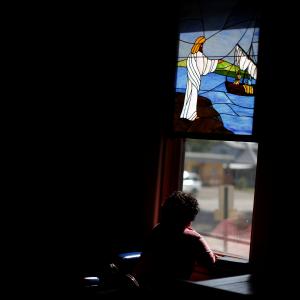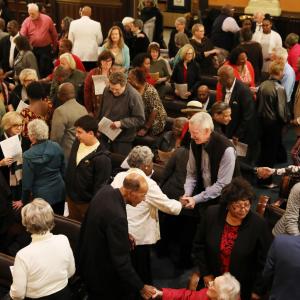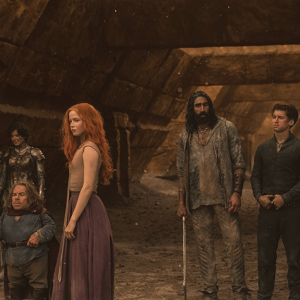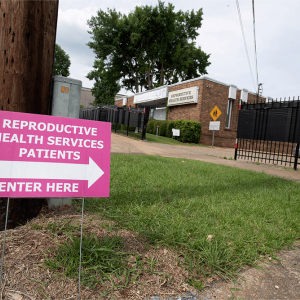
Michael Woolf is the senior minister of Lake Street Church of Evanston in Illinois and the author of Sanctuary and Subjectivity: Thinking Theologically About Whiteness and Sanctuary Movements. He is the co-founder of Challenging Islmophobia Together Chicagoland with his spouse, Rev. Anna Piela.
Posts By This Author
Trump Wants to End Sanctuary Churches. We Won’t Be Intimidated
As we enter a second Donald Trump presidency, the stakes could not be higher for undocumented people and asylum seekers in this country. Having promised mass deportations to a degree never attempted in the United States, President-elect Trump’s new border czar, Tom Homan, has signaled that the administration’s cruelty will begin in my backyard — Chicago. What he might not be counting on is organized resistance from labor, faith, and immigration leaders that will attempt to thwart these plans.
In Difficult Times, We Find Out What Kind of Christians We Are
We are in for a difficult four years as a country. During the first four years of Donald Trump’s administration, I did not hesitate to call him a fascist, and looking ahead to his next four years, I am so worried about vulnerable people in this country. I am worried about immigrants. I am worried about queer people and trans kids. I am worried, yes, but I know that even in the most difficult time, miracles are possible.
4 Kids’ Movies That Gave Me Glimpses of God’s Parental Love
THE BIBLE REPEATEDLY points us toward understanding God as a parent. Jesus recommends we call God “Dad,” or “Abba” in Aramaic (Matthew 6:9), and compares himself to a mother “hen [who] gathers her chicks under her wings” (Luke 13:34). And in the Hebrew scriptures, God often appears as a parent. Consider this description of God’s relationship to us from Hosea 11:3-4 and see if you don’t get a little misty-eyed: “Yet it was I who taught Ephraim to walk; I took them up in my arms, but they did not know that I healed them. I led them with cords of human kindness, with bands of love. I was to them like those who lift infants to their cheeks. I bent down to them and fed them.”
As a parent, I get glimpses of that love: The joy I felt watching my daughter score her first goal in soccer. The worry I felt when I saw her fight through a string of stomach bugs. But most surprisingly, I’ve caught glimpses of God’s parental love when watching kids’ movies with my child, particularly films from 2024.
One moment in particular, a scene from Despicable Me 4, of all things, really hammered home the link between parenting and God. Throughout the film, the main character, Gru, struggles to connect with his son, Gru Jr. When Gru Jr. finds another father figure, someone who will bring harm to Gru, Gru still offers his child one last gift by saying, “It’s okay, Junior. Dada loves you.” There was something about that scene showcasing the fierce love of a parent for their children, even when that love hurts, that made me understand that movies, especially kids’ movies, can be a fantastic way to gain some understanding of what God’s love might look like.
God Isn't a Republican or a Democrat; God Is an Immigrant
God’s first house — the tabernacle — is movable, following the Israelites as they wander from Egypt to Canaan (Exodus 40:34; Numbers 1:47-53). The theme of migration continues into Jesus’ life, where Matthew’s gospel tells us that he fled political violence and spent much of his childhood in Egypt (Matthew 2:13-23). Even when he is back in his own country, he is unwelcome in his hometown and “has nowhere to lay his head” (Matthew 8:20).
Faith Used to Fuel My Anxiety. Now Meditation Eases My OCD
I had been doing therapy for a decade with little results, but things really began to change when I started meditating.
Paul Atreides of ‘Dune’ Is a Messiah-Figure — And a Villain
The Dune series’ ambivalence and criticism about the role of the messiah lends some light on one of scripture’s more enigmatic ideas: the messianic secret.
4 Tips for Leading a Church in an Election Year
It’s an election year again, and so far it sees that President Joe Biden and former President Donald J. Trump will again be on the ballot for the White House in 2024. For many churches, that means a repeat of 2020’s division, misinformation, and difficult decisions about corporate worship.
Buckle up.
We have been on this ride before, but that doesn’t mean it will be any easier.
Churches: We Need to Reconsider Our Facebook Accounts

Supporters of the lawsuit stand in front of the Berlin Regional Court before the start of the hearing of Environmental Action Germany's landmark lawsuit against the U.S. internet giant Meta (Facebook, Instagram) at the Berlin Regional Court, Nov. 21, 2023. Credit: Carsten Koall/dpa via Reuters Connect.
In October of last year, 33 states sued Meta, the parent company of Facebook, Instagram, and WhatsApp, alleging that the company has “concealed the ways in which these Platforms exploit and manipulate its most vulnerable consumers: teenagers and children.” The lawsuit further alleges that the company “repeatedly mislead the public about the substantial dangers of its Social Media Platforms.” The most recent lawsuits make it clear that churches, that are operating large numbers of social media accounts, must do some soul-searching about whether they should stay on platforms that are causing harm to young people.
The Bible Lessons in ‘Good Omens’
IN THE THEOLOGY course on suffering that I teach at Lewis University, the Book of Job is required reading. Its plot can be hard to stomach: Satan believes that Job only loves God because the faithful servant has a blessed life. Looking to prove Job’s unconditional loyalty, God gives the accuser permission to take everything from Job except his life. The wager causes Job great suffering. When God finally arrives on the scene (Earth), we get some beautiful, albeit troubling, poetry. God says that God’s ways are beyond human understanding and especially human questioning. As one of my students put it last year, “God is kind of a jerk.”
Season 2 of Good Omens, streaming on Prime, leans into that confusing characterization of God. The fantasy comedy follows the unlikely friendship of Aziraphale (an angel) and Crowley (a demon). After thousands of years together on Earth, they find themselves more at home with humans than with angels or demons.
Denominations Are Dying. But the Church Can Still Thrive
In July, Ryan Burge, an associate professor of political science at Eastern Illinois University and an ordained minister in the American Baptist Church, made a case on his Substack that, with the exception of the rise of those who identify as non-religious or “nones,” the most important trend in American religiosity is the rise of nondenominational churches. For those who are actively engaged in denominational life, the numbers are staggering.
When taken together, those attending nondenominational churches now make up the second largest religious group in the United States after Roman Catholics. Rising from a mere 5 percent of the U.S. religious landscape in 1984, nondenominational adherents are now estimated to represent an astonishing 22 percent.
Jesus, Labor Agitator
According to a recent Gallup poll, labor unions are enjoying their highest levels of national national support since 1965. One major reason for renewed labor organizing is the COVID-19 pandemic, as workers started to ask whether a new future for work was possible in the midst of the pandemic. Some of the demands that laborers were making then are still being made now: increased pay, safer working conditions, and flexible schedules. In the U.S., the federal minimum wage is still a paltry $7.25 per hour. Federal minimum wage has not increased since July 2009 but if it had been keeping up with inflation, it would be over $21 an hour today.
What would Jesus have to say about America’s hot labor summer specifically, and the renewed organized labor movement more generally speaking?
White Congregations Can’t Do Justice Without Following Black Leaders
Recently, a report from Public Religion Research Institute (PRRI) found that Black Protestants are the only Christian group in which a majority — 63 percent — believes that congregations should get involved in social issues even if doing so means having difficult conversations about politics. This tells me that white congregations, in contrast, believe that churches are best left as places of solace, where difficult conversations do not take place. Ultimately, this allows for white supremacy to remain intact within these houses of worship. I am the senior pastor of Lake Street Church of Evanston, a predominantly white church, and our path out of white supremacy has required us to take the lead from Black congregations on a variety of social justice issues.
Women, LGBTQ People Take Lead in ‘Willow’ ... And in Church?
Willow has all the themes you’d expect from a fantasy adventure: The party is assembled, there’s a quest, and they go on a rescue mission. The party has a rogue (Amar Chadha-Patel as Boorman), a wizard (Warwick Davis reprising his role as Willow), a bard (Tony Revolori as Graydon ), a paladin knight (Erin Kellyman as Jade), a princess (Ruby Cruz as Kit), and a chosen one (Ellie Bamber as Elora). Notably missing from the 1988 cast is Val Kilmer as Madmartigan (Kilmer is recovering from throat cancer.) The enemies are mainly the Crone, who live in the immemorial city, as well as an unseen quasi-deity that lives below ground — simply titled “the Wyrm.” As with any good fantasy, it’s less concerned about the plot than it is about showing the characters interact, grow, and change, along with a decent amount of throwbacks to the original movie.
Puss in Boots’ Nine Wild and Precious Lives
Being unafraid of death is easier said than done. Death is one of the great fears that stalks the minds and hearts of human beings. That being said, there are times when Paul still dares to mock death: “‘Where, O death, is your victory? Where, O death, is your sting?’” (1 Corinthians 15:55). As a pastor, I have held plenty of hands as people die, yet I have never heard such boasting. What I have heard are regrets, contentment, fear, and any number of emotions. How we face death is complicated.
The Christian Roots of Abortion Sanctuaries
Now that federal abortion rights have been struck down by the Supreme Court in Dobbs v. Jackson, we need a new sanctuary movement that takes seriously the threat posed by the criminalization of abortion and acts to care for those seeking it.
What Reparations Is Costing My Church
In effect, imagining churches as places uniquely positioned for practicing reparations means a paradigm shift in how churches imagine themselves in their communities. Churches are capable of celebrating beauty but they are also capable of creating wounds. Such a shift would be akin to what theologian Rev. Kelly Brown Douglas refers to as “broaden[ing] our moral imagination.” For the church to broaden its moral imagination, congregations need to start asking questions like: What does it mean to own property? Who did that exclude in the context of redlining? What assumptions are we making about the assumed good of a church’s continued existence in a place? Being open to accountability and discernment about reparations means that no question, no matter how difficult or threatening to the continuance of a congregation, is off-limits.
Remain in Mexico, Remain in Egypt
As Christians, we believe it is not just immigrants or asylum seekers who are being bandied about as political pawns; it is Jesus himself. Jesus is being denied adequate legal advice; he has been denied the rights to asylum that are guaranteed under international law. Jesus himself is at risk of being kidnapped and exploited due to the Biden administration’s policies. This Advent, as Christians the world over contemplate the birth of Jesus, they cannot ignore where he is incarnate now, nor the policy decisions that make him absent in our communities.
Christians Can't Ignore the Border Crisis in Our Hearts
In the United States, white supremacy has made it impossible to see immigrants — but especially Haitian immigrants — as siblings who God commands us to love as though they were our neighbors. The U.S. has long resisted seeing Haitians not only as neighbors but as humans.
Using the Bible to Debunk 10 Myths About Reparations
Talking about reparations in church inevitably brings up theological and economic questions. Sometimes these questions are asked in good faith. Other times, these questions are based on myths that need to be deconstructed.

















